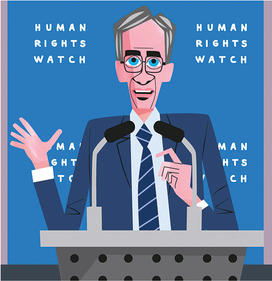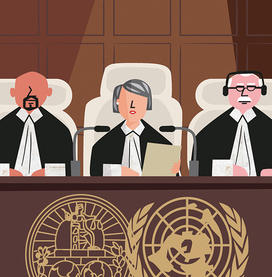Kenneth Roth Champions Universal Human Rights
Kenneth Roth spent nearly 30 years as executive director of Human Rights Watch (HRW), a leading advocacy and research organization that defends human rights around the world. He developed an interest in human rights from an early age, he says, influenced by his father fleeing Nazi-controlled Frankfurt, Germany, at age 12.
As a young adult, Roth knew he wanted a career in public service, but the opportunities were scarce. He pursued volunteer work in human rights while working as a federal prosecutor in New York. At the time, HRW was a tiny organization, but when they offered him a job, he accepted eagerly. “My friends thought I was crazy … but it was the best move I ever made,” he says. Roth joined Princeton in the fall as the Charles and Marie Robertson Visiting Professor at the Princeton School for Public and International Affairs (SPIA).
Quick Facts
Title
Charles and Marie Robertson Visting Professor
Time at Princeton
1 semester
Recent Class
Strategies for Enforcing Human Rights
Roth’s Research
A Sampling

Book Project
Roth’s forthcoming book, Righting Wrongs, draws on his experience at HRW to demonstrate how human rights activism can achieve measurable progress. “There’s a tendency to think of human rights activism as well-meaning but ineffectual,” he says, a mindset he sets out to disprove with numerous examples of tangible victories. Governments use human rights violations as a tool to retain power and suppress dissent, but activism can overcome this — whether through shaming an abusive government and undermining its legitimacy, or working with allies to prevent a government from obtaining something it wants, such as military aid. As Roth explains, “it’s all about generating pressure on governments, and we have become very good at generating pressure and forcing them to move.”

Sharing Knowledge
Although Roth stepped away from his former role to devote time to teaching, he remains busy with regular media appearances and public speaking engagements. To date, he has published over 300 articles about human rights in a variety of publications. He is often invited to speak in response to current events, such as the ongoing Israel-Hamas war and debates about academic freedom. Some of Roth’s views, including his critical stance toward Israel (under his leadership HRW accused Israel of apartheid), have attracted controversy, but at Princeton, where he’s hosted public conversations about the Israel-Hamas war, he says he’s been “impressed ... by the willingness to discuss, reasonably and civilly, a complicated issue.”

Justice for All
Last semester, Roth taught two courses at SPIA: one based on the content of his forthcoming book and a second on the topic of international criminal justice. According to Roth, “the norm until … the 1990s was that if you were ruthless enough, you could get away with atrocities [and] with impunity because you would just crush any attempt domestically to hold you to account.” Since then, a growing effort has emerged to establish international options, such as the International Criminal Court, that can hold government officials accountable even if they evade prosecution in their own countries. Roth and his students explored the successes and shortcomings of the current international criminal justice framework and considered how it might be improved.












No responses yet